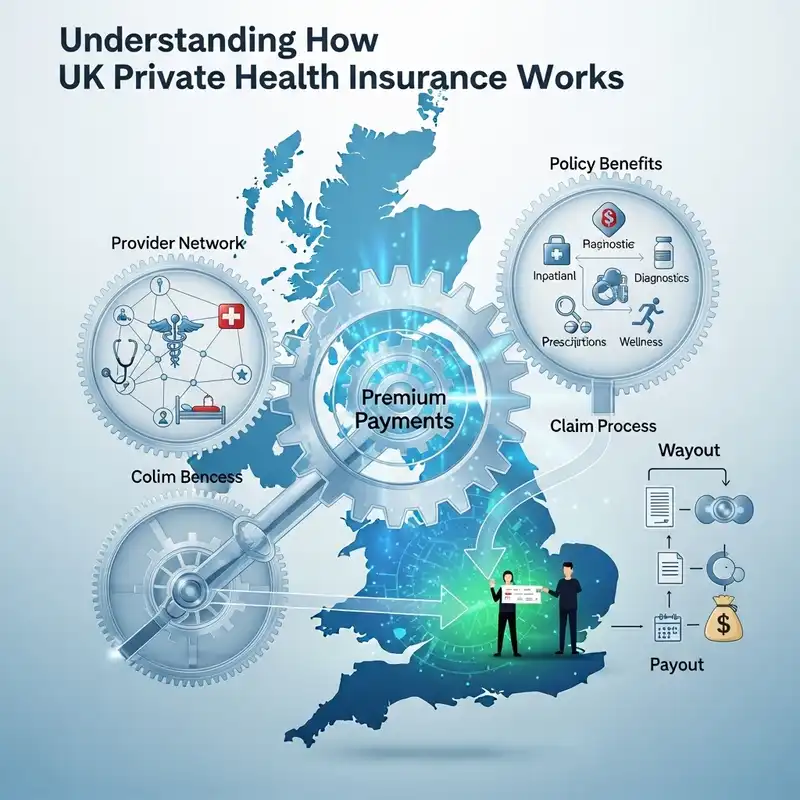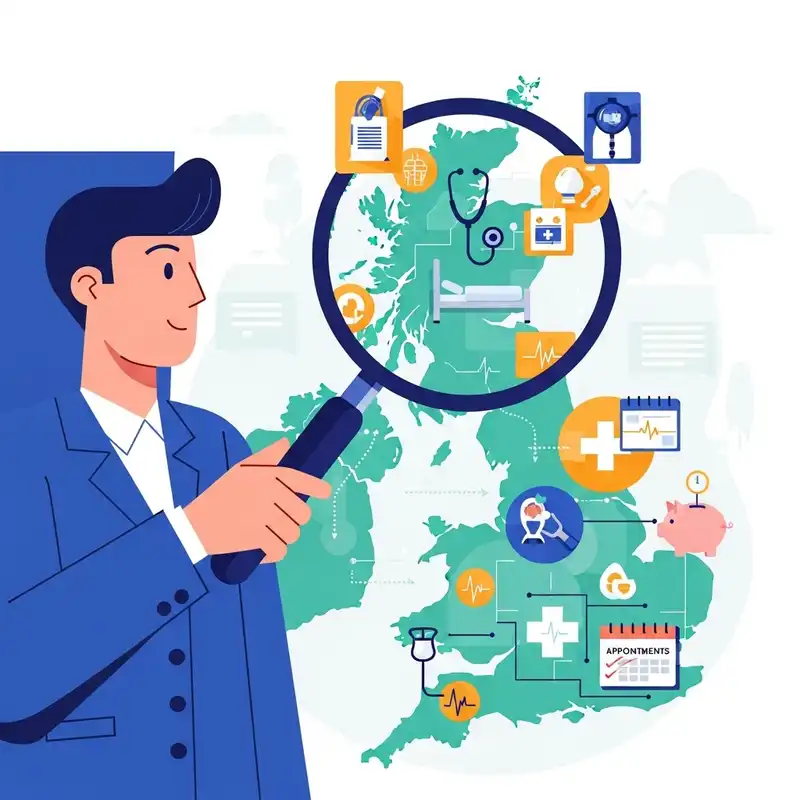TL;DR
The pursuit of a fulfilling life is a universal ambition. We strive for career progression, personal development, and precious moments with loved ones. We embrace wellness culture, from mindful eating to marathon training, meticulously building a better version of ourselves.
Key takeaways
- Assess Your Reality: Take a clear-eyed look at your finances. What is your monthly income? What are your essential outgoings (mortgage/rent, bills, food)? Who depends on you financially? What debts do you have?
- Quantify Your Need: Based on your assessment, calculate the financial gap. How much income would need to be replaced if you couldn't work? How much capital would be needed to clear your mortgage and provide for your children?
- Review Existing Protection: Check your employment contract. What sick pay do you receive, and for how long? Do you have any 'death-in-service' benefits? This cover is a great start, but it's tied to your job and often isn't enough on its own.
- Seek Expert Guidance: The world of protection insurance can be complex, with hundreds of policy variations. This is not a journey you should take alone. Navigating this landscape can feel complex, which is why working with an expert broker like us at WeCovr is so valuable. We compare policies from all the leading UK insurers to find a plan that fits your life and budget perfectly, ensuring there are no gaps in your armour.
- Embrace Holistic Wellbeing: Remember that financial and physical health are intertwined. As part of our commitment to your holistic wellbeing, WeCovr customers also receive complimentary access to our AI-powered calorie tracking app, CalorieHero, helping you manage your health alongside your financial security.
Beyond Self Care Your Unbreakable Future
The pursuit of a fulfilling life is a universal ambition. We strive for career progression, personal development, and precious moments with loved ones. We embrace wellness culture, from mindful eating to marathon training, meticulously building a better version of ourselves. Yet, a stark reality often remains unaddressed in our personal growth plans: our vulnerability to life's most profound challenges.
The projection from Cancer Research UK that one in two of us born after 1960 will be diagnosed with some form of cancer in our lifetime is a sobering statistic. It underscores a crucial truth: while self-care can mitigate risks, it cannot eliminate them. True, lasting resilience is built on two pillars: the healthy habits we cultivate daily and the robust financial safety net we construct for the unexpected.
This guide is not about fear. It is about empowerment. It’s about looking life’s uncertainties in the eye and architecting a future where your ambitions, your family, and your peace of mind are shielded. This is the new frontier of personal development—moving beyond self-care to create an unbreakable foundation.
The New Reality: Why Self-Care Isn't Enough
We live in an era that rightly champions wellbeing. The NHS Eatwell Guide informs our diets, fitness apps track our steps, and mindfulness is no longer a niche concept. These practices are fundamentally important, demonstrably improving health outcomes and reducing the risk of many chronic conditions.
However, they are not an impenetrable shield. Accidents still happen. Hereditary conditions can emerge. And serious illnesses like cancer, heart disease, or stroke can affect even the healthiest among us.
When a significant health event occurs, the impact is rarely confined to the physical. It creates financial shockwaves that can be just as debilitating. Consider the hidden costs of a serious illness:
- Loss of Income: This is the most immediate and significant impact. Statutory Sick Pay (SSP) provides a minimal safety net (£116.75 per week as of 2024/25), which is rarely enough to cover essential outgoings like a mortgage, rent, or utility bills.
- Increased Expenses: Life with a serious illness is more expensive. Costs can include travel to and from hospital appointments, hospital parking fees, prescription charges, and potentially the need for private consultations or therapies not immediately available on the NHS.
- Home Modifications: A long-term condition might necessitate changes to your living space, such as installing a stairlift or converting a bathroom, leading to substantial one-off costs.
- The 'Partner Penalty': Often, a partner or family member must reduce their working hours or leave their job entirely to provide care, further straining the household's finances.
A 2023 report from Macmillan Cancer Support highlighted that 83% of people with cancer in the UK experience a financial impact, which on average reaches £891 a month. This "cost of cancer" demonstrates that relying solely on savings or a basic state provision is a high-risk strategy. Your emergency fund, diligently built for a boiler breakdown or car repair, can be depleted in a matter of months. (illustrative estimate)
This is where strategic financial planning transcends traditional self-care. It’s the act of preparing for the consequences, not just trying to avoid the cause. It’s about ensuring that if your health falters, your financial life doesn't fall apart with it.
The Core Four: Your Personal Financial Shield
Building this financial resilience involves a multi-layered approach. Think of it not as a single product, but as a suite of tools, each designed for a specific purpose. For most individuals and families in the UK, the foundation rests on four key pillars of protection.
1. Life and Critical Illness Cover
This is perhaps the most well-known form of protection. It’s a hybrid policy that provides a tax-free lump sum under two circumstances: if you pass away during the policy term, or if you are diagnosed with one of a specific list of serious medical conditions.
- Who needs it? Anyone with financial dependents or significant debts like a mortgage. If your income is essential to your family's lifestyle, this cover is critical.
- How it works in practice: Imagine a 40-year-old architect with a spouse, two children, and a £250,000 mortgage. She is diagnosed with a major heart condition that requires surgery and a long recovery. Her Critical Illness Cover pays out the policy amount, say £250,000. This lump sum allows her family to clear their mortgage entirely, removing their largest monthly expense. It provides the breathing room for her to focus completely on her recovery, without the stress of rushing back to work.
While policies vary between insurers, most will cover a core set of conditions.
| Commonly Covered Critical Illnesses | Description |
|---|---|
| Cancer | Specific types and severities are defined in the policy. |
| Heart Attack | Of a specified severity. |
| Stroke | Resulting in permanent symptoms. |
| Multiple Sclerosis | With persisting symptoms. |
| Major Organ Transplant | Covering the receipt of a major organ. |
| Kidney Failure | Requiring permanent dialysis. |
2. Income Protection
Often hailed by financial experts as the most essential protection policy, Income Protection does exactly what its name suggests: it protects your income. If you are unable to work due to any illness or injury, after a pre-agreed waiting period (the 'deferment period'), the policy pays out a regular, tax-free monthly income.
This is crucially different from Critical Illness Cover. It isn't tied to a specific list of conditions. A debilitating back injury, severe depression, or long-term exhaustion that prevents you from performing your job could all trigger a claim.
- Key Features:
- Deferment Period: This is the time you wait between being signed off work and when the payments start. It can range from one week to 12 months. Aligning this with your employer's sick pay policy or your savings is a smart way to manage premiums.
- Benefit Period: This is how long the policy will pay out for. It can be for a fixed term (e.g., 2 or 5 years per claim) or until you reach retirement age.
- Who needs it? Every single person whose lifestyle depends on their monthly salary. This is your personal safety net against the financial consequences of being unwell.
Let's compare it to the state provision:
| Feature | Statutory Sick Pay (SSP) | Income Protection |
|---|---|---|
| Weekly Amount | £116.75 (2024/25 rate) | Up to 50-70% of your gross salary. |
| Duration | Maximum of 28 weeks. | Can pay out until your chosen retirement age. |
| Eligibility | For employees earning above the LEL. | Available to employed and self-employed. |
| Purpose | Basic subsistence. | To maintain your lifestyle and cover key bills. |
3. Family Income Benefit (FIB)
Family Income Benefit is a clever and often more affordable alternative to traditional lump-sum life insurance. Instead of paying out a large single sum upon death, it provides the bereaved family with a regular, tax-free monthly or annual income.
This income is paid from the time of the claim until the end of the policy's term. This structure is perfectly designed to protect a young family during their most vulnerable years.
- How it works in practice (illustrative): A couple takes out a 20-year FIB policy when their first child is born, aiming to protect their family until the child finishes university. They choose a benefit of £2,000 per month. If one parent passes away 5 years into the policy, the surviving partner will receive £2,000 every month for the remaining 15 years of the term. This provides a steady, manageable income stream to cover household bills, childcare, and everyday costs, mirroring the lost salary in a way a lump sum might not.
4. Private Health Insurance (PMI)
While the NHS is a national treasure, it is facing unprecedented pressures, leading to longer waiting lists for diagnostics and non-urgent treatments. This is where Private Health Insurance (also known as Private Medical Insurance or PMI) acts as a powerful complement.
Its primary benefit is speed. PMI can provide prompt access to:
- Specialist Consultations: See a consultant quickly to understand your condition.
- Advanced Diagnostics: Get fast access to MRI, CT, and PET scans, which are crucial for a swift and accurate diagnosis.
- Treatment: Receive eligible treatments, including surgery, in a private hospital at a time that suits you.
This acceleration is not just about convenience; it's about better outcomes. An earlier diagnosis can lead to more effective treatment, and a quicker return to health means a quicker return to work and normality. For a business owner or a key employee, this can be invaluable. At WeCovr, we can help you navigate the different levels of PMI, from basic diagnostic cover to comprehensive plans that include therapies and mental health support.
The Specialist's Toolkit: Protection for the Self-Employed and Tradespeople
The UK's dynamic workforce includes over 4.2 million self-employed individuals, alongside countless people in physically demanding roles like electricians, plumbers, nurses, and construction workers. For this group, the absence of an employer's safety net makes personal protection non-negotiable.
Personal Sick Pay Insurance
For those in riskier professions or on zero-hours contracts, a traditional Income Protection policy with a long deferment period might not feel right. This is where Personal Sick Pay insurance comes in. It is essentially a form of short-term Income Protection, designed for immediate impact.
- Key Difference: The primary distinction is the deferment period. These policies often have options for 'Day 1' or 'Week 1' cover, meaning they start paying out almost immediately after you're unable to work.
- Who it's for: A self-employed electrician who twists an ankle and can't climb a ladder for three weeks. A freelance writer who suffers from a bout of vertigo and can't look at a screen. An agency nurse who gets the flu and has no company sick pay to fall back on. Personal Sick Pay bridges that immediate financial gap.
| Comparison Point | Personal Sick Pay | Full Income Protection |
|---|---|---|
| Typical Deferment | Day 1, 1 week, 2 weeks | 1 month, 3 months, 6 months+ |
| Benefit Period | Short-term (e.g., 12 or 24 months) | Can be long-term (until retirement) |
| Ideal User | Tradespeople, freelancers needing immediate cover. | Anyone needing long-term income replacement. |
| Cost | Generally lower premiums for short-term cover. | Higher premiums for comprehensive long-term cover. |
For the self-employed, Income Protection isn't just a 'nice-to-have'; it is their sick pay, their only financial backstop if illness or injury strikes. It's the policy that keeps the business afloat and the personal bills paid.
For the Visionaries: Protecting Your Business and Legacy
For company directors and business owners, financial resilience extends beyond personal circumstances. It involves safeguarding the very entity you have worked so hard to build, and ensuring your personal wealth is passed on efficiently to the next generation.
Business Protection Insurance
Your business has its own vulnerabilities. The loss of a key individual can have a catastrophic impact on operations, profitability, and confidence among clients and lenders.
- Key Person Insurance: This policy is taken out and paid for by the business on the life of a crucial employee—this could be a founder, a top salesperson, or a technical genius. If this 'key person' dies or is diagnosed with a specified critical illness, the policy pays a lump sum directly to the business. These funds can be used to cover lost profits during a period of disruption, recruit and train a suitable replacement, or reassure investors and clear business loans.
- Executive Income Protection: This is an Income Protection policy for a director or key employee, but it is owned and paid for by the company. This is a highly tax-efficient way to provide protection, as the premiums are typically considered a legitimate business expense. It also serves as a powerful employee benefit, aiding in the attraction and retention of top talent.
Securing Your Legacy: Life Protection and Gift Inter Vivos
As you build wealth, thoughts turn to how it will be passed on. Inheritance Tax (IHT) can significantly reduce the value of the estate you leave to your loved ones. Strategic use of life insurance is a cornerstone of effective estate planning.
- Life Protection for IHT: A 'whole-of-life' insurance policy can be set up to pay out a lump sum upon your death. If this policy is written 'in trust', the payout falls outside your estate and can be used directly by your beneficiaries to pay the resulting Inheritance Tax bill. This ensures they inherit the assets (like the family home) without being forced to sell them to cover the tax.
- Gift Inter Vivos Insurance: In the UK, if you gift a significant asset (cash, property) and then pass away within seven years, that gift may still be subject to IHT. This is known as a Potentially Exempt Transfer (PET). A Gift Inter Vivos policy is a specialised form of life insurance designed to cover this specific liability. It runs for seven years and pays out if the gift-giver dies within that period, providing the recipient with the funds to pay the unexpected tax bill.
| Business & Legacy Protection | What it Protects | Who it's For |
|---|---|---|
| Key Person Insurance | Business continuity and profitability. | Companies reliant on specific individuals. |
| Executive Income Protection | An employee's income (tax-efficiently). | Company directors and valuable employees. |
| Life Protection in Trust | Your estate from an IHT bill. | Individuals with estates over the IHT threshold. |
| Gift Inter Vivos | The recipient of a large gift from IHT. | Individuals making large gifts to family. |
Building Your Unbreakable Foundation: A Practical Action Plan
Understanding these concepts is the first step. Taking action is what creates real security. Here’s a simple plan to get you started.
- Assess Your Reality: Take a clear-eyed look at your finances. What is your monthly income? What are your essential outgoings (mortgage/rent, bills, food)? Who depends on you financially? What debts do you have?
- Quantify Your Need: Based on your assessment, calculate the financial gap. How much income would need to be replaced if you couldn't work? How much capital would be needed to clear your mortgage and provide for your children?
- Review Existing Protection: Check your employment contract. What sick pay do you receive, and for how long? Do you have any 'death-in-service' benefits? This cover is a great start, but it's tied to your job and often isn't enough on its own.
- Seek Expert Guidance: The world of protection insurance can be complex, with hundreds of policy variations. This is not a journey you should take alone. Navigating this landscape can feel complex, which is why working with an expert broker like us at WeCovr is so valuable. We compare policies from all the leading UK insurers to find a plan that fits your life and budget perfectly, ensuring there are no gaps in your armour.
- Embrace Holistic Wellbeing: Remember that financial and physical health are intertwined. As part of our commitment to your holistic wellbeing, WeCovr customers also receive complimentary access to our AI-powered calorie tracking app, CalorieHero, helping you manage your health alongside your financial security.
Beyond the Policy: The Power of Wellbeing and Prevention
Architecting your financial resilience does not mean you should stop focusing on your physical and mental health. In fact, they work in harmony. A healthier lifestyle not only improves your quality of life but can also lead to lower insurance premiums.
Continue to invest in your wellbeing through:
- A Balanced Diet: Focus on whole foods, fruits, vegetables, and lean proteins, as outlined in the NHS Eatwell Guide.
- Regular Movement: Aim for at least 150 minutes of moderate-intensity activity (like a brisk walk or cycling) or 75 minutes of vigorous-intensity activity (like running or tennis) a week, plus strength exercises on two or more days.
- Prioritising Sleep: Consistent, quality sleep (typically 7-9 hours for adults) is vital for physical repair and mental clarity.
- Attending Screenings: Never ignore an invitation for NHS health checks or cancer screenings (such as cervical, breast, and bowel cancer screening). Early detection saves lives.
Insurance is the safety net for when prevention isn't enough. It's the plan for the "what if," allowing you to live your life more fully in the "right now."
Conclusion: Architecting Your Future, Fearlessly
Returning to that striking 1-in-2 statistic, we are faced with a choice. We can view it with anxiety, or we can see it as a call to action—a catalyst for building a more robust, resilient, and truly unbreakable future.
Personal growth in the 2020s and beyond requires a new definition. It's not just about climbing the career ladder or setting new personal bests. It’s about having the wisdom to protect what you're building. It's the peace of mind that comes from knowing that if life throws its toughest challenges at you, you and your loved ones are protected.
Life insurance, critical illness cover, and income protection are not mere expenses. They are investments in your future self, your family's security, and your freedom to pursue your dreams without fear. Don't leave your future to chance. Start architecting your unbreakable foundation today.
Is life insurance expensive?
Do I need income protection if I have savings?
What's the difference between Critical Illness Cover and Income Protection?
Can I get cover if I have a pre-existing medical condition?
Why should I use a broker like WeCovr instead of going direct to an insurer?
As a freelancer, which insurance is the most important for me?
Sources
- Office for National Statistics (ONS): Mortality and population data.
- Association of British Insurers (ABI): Life and protection market publications.
- MoneyHelper (MaPS): Consumer guidance on life insurance.
- NHS: Health information and screening guidance.

































